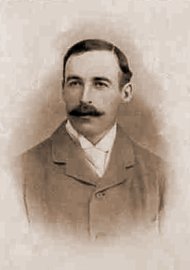
A reviewer wrote in the journal Man : “The result is this magnificently printed and illustrated mixture of travel notes and impressions, historical and archeological research, political ratiocination, and geographical information.” He was talking about Henry Finnis Blosse Lynch’s Armenia: Travels and Studies, which became the premier source of historical and geographic information about Armenia at the beginning of the twentieth century.
Lynch was a British traveler and politician with an Armenian connection. His maternal grandfather, Robert Taylor, was a twenty-year-old ensign member of the British East India Company sent to Persia who eloped with the twelve-year-old Rosa, daughter of an Armenian merchant of Shiraz, in the 1790s. One of his daughters, Caroline, married Lt. Henry Blosse Lynch, of the East India Company navy. In 1841 the latter founded Lynch Brothers in Baghdad, a commercial firm that exported goods from Great Britain to Mesopotamia, along with two of his brothers. One of them, Thomas, a classical scholar at Trinity College in Dublin, ended up marrying Harriet, Caroline’s sister, who became the mother of H. F. B. Lynch, and the other, Stephen, married a daughter of another Armenian merchant.
Henry F. B. Lynch was born on April 18, 1862, in London. He was educated at Eton College, the University of Heidelberg (Germany), and Trinity College in Cambridge. He relinquished a career in law in favor of working for Lynch Brothers. In the late 1880s, he was sent to Baghdad to learn the company business and expand it into Persia. He became the company's chairman in 1896.
In the meantime, his Armenian connection—which he avoided to mention in his book—possibly led him to undertake a seven-month trip to Armenia in 1893-1894, where he attended the consecration of Khrimian Hayrig as Catholicos. He would have another four-month trip in 1898, accompanied by F. Oswald, with whom he collaborated in producing a detailed map of historic Armenia and its neighbors. Three years later, he published his two volume book, Armenia . It was reprinted in 1967, 1990, and 2011. The reprint of 1990 was undertaken by the Armenian Prelacy. The two-volume set along with a beautiful color reproduction of his original map were quickly sold-out. The book was translated twice into Armenian (London, 1902, and Constantinople, 1913-1914). He wrote on the Cathedral of Ani, for instance: “The impression which we take away from our survey of these various features is that we have been introduced to a monument of the highest artistic merit, denoting a standard of culture which was far in advance of the contemporary standards in the West.”
Lynch was elected in 1906 as a member of the British Parliament for Ripon, but was defeated in 1910. He suddenly passed away at Calais (France) on November 24, 1913.